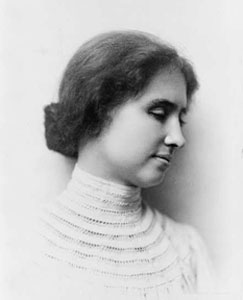 This Goodly Land
This Goodly Land
Helen Keller (June 27, 1880–June 1, 1968)

Other Names Used
- Helen Adams Keller: full name
Alabama Connections
- Tuscumbia, Colbert County: birthplace, childhood residence
Selected Works
- Keller, Helen, and Anne Mansfield Sullivan. The Story of My Life. Ed. John Albert Macy. New York: Doubleday, Page & Co., 1903. Rpt. Garden City, N.Y.: Doubleday, 1954. Rpt. New York: Norton, 2003. Rpt. New York: Modern Library, 2003. An online version of The Story of My Life is available from American Foundation for the Blind.
- Keller, Helen. The World I Live In. New York: Century Co., 1908. Rpt. New York: New York Review Books, 2003. An online version of The World I Live In is available from Google Book Search.
- Keller, Helen. Out of the Dark: Essays, Letters, and Addresses on Physical and Social Vision. Garden City, N.Y.: Doubleday, Page & Co., 1913. An online version of Out of the Dark is available from Google Book Search.
- Keller, Helen. Teacher: Anne Sullivan Macy: A Tribute by the Foster Child of Her Mind. New York: Doubleday, 1955.
Biographical Information
Helen Keller suffered a severe illness in early childhood that left her blind and deaf. Her inability to communicate led her parents to consult with Dr. Alexander Graham Bell. As a result of this consultation, the Perkins Institution for the Blind sent one of its recent graduates, Anne Sullivan, to the Keller household to teach the child. Sullivan taught her pupil to use the manual alphabet used by the deaf by forming the signs in her hand. Once Keller realized that the mysterious movements were not a game but symbols for real things, the world of language was opened to her. With Sullivan’s assistance, she eventually learned to speak, not only English, but also French and German. After studies at several schools, Keller earned a BA, cum laude, from Radcliffe College in 1904.
Keller devoted the rest of her life to social reform, especially the treatment and education of disabled persons. She founded organizations, wrote books and essays, and gave lectures to raise public awareness. Keller was also interested in other aspects of social reform, including votes for women and the rights of labor unions to organize. She believed that making the world better for some meant making it better for all. She was awarded many medals for her humanitarian efforts, including the Legion of Honor from France (1952) and the Presidential Medal of Freedom (1964). After a stroke in 1961, Keller retired from public life and lived quietly until her death in 1968. Her story has been presented several times on the stage, in films, and in television productions.
Interests and Themes
Helen Keller’s memoir The Story of My Life has inspired many, handicapped and non-handicapped alike. Her other writings brought the general public to an awareness of the conditions under which many disabled persons suffered and were instrumental in reforming those conditions.
For More Information
Please check your local library for these materials. If items are not available locally, your librarian can help you borrow them through the InterLibrary Loan program. Your librarian can also help you find other information about this author.
There may be more information available through the databases in the Alabama Virtual Library. If you are an Alabama citizen, AVL can be used at your public library or school library media center. You can also get a username and password from your librarian to use AVL at home.
Reference Books
- Dash, Joan. The World at Her Fingertips: The Story of Helen Keller. New York: Scholastic Press, 2001. For younger readers.
- Herrmann, Dorothy. Helen Keller: A Life. New York: A. Knopf, 1998.
- Hurwitz, Johanna, and Neverne Covington. Helen Keller: Courage in the Dark. New York: Random House, 1997. For younger readers.
- Lash, Joseph P. Helen and Teacher: The Story of Helen Keller and Anne Sullivan Macy. New York: AFB Press, 1997.
- Lawlor, Laurie. Helen Keller: Rebellious Spirit. New York: Holiday House, 2001. For younger readers.
Reference Articles
- Nielsen, Kim E. "The Grown-Up Helen Keller: 'Good Will Ambassador to the World'". Alabama Heritage 92. (2009): 20-29.
Reference Web Sites
- Helen Keller. 2005. American Foundation for the Blind. http://www.afb.org/section.asp?sectionid=1 .
- Ivy Green: Birthplace of Helen Keller. 2004. Helen Keller Birthplace Foundation, Inc.. http://www.helenkellerbirthplace.org/ .
- "The Story of My Life [audiobook]". LibriVox. 2007. http://librivox.org/the-story-of-my-life-by-helen-keller/.
- "(Rare!) Helen Keller & Anne Sullivan (1930 Newsreel Footage)". YouTube.. 2009. http://www.youtube.com/watch?v=Gv1uLfF35Uw.
- Nielsen, Kim. "Helen Keller". The Encyclopedia of Alabama. 2008. Alabama Humanities Foundation and Auburn University. http://www.encyclopediaofalabama.org/face/Article.jsp?id=h-1123.
- Ozick, Cynthia. "What Helen Keller Saw: The Making of a Writer". The New Yorker. 2003. Conde Nast Digital. http://www.newyorker.com/archive/2003/06/16/030616crat_atlarge?currentPage=all.
Location of Papers
- American Foundation for the Blind
- Harvard University
- Library of Congress
Photo courtesy of the Library of Congress, Prints & Photographs Division, LC-USZ62-112513.
Last updated on Dec 18, 2007.